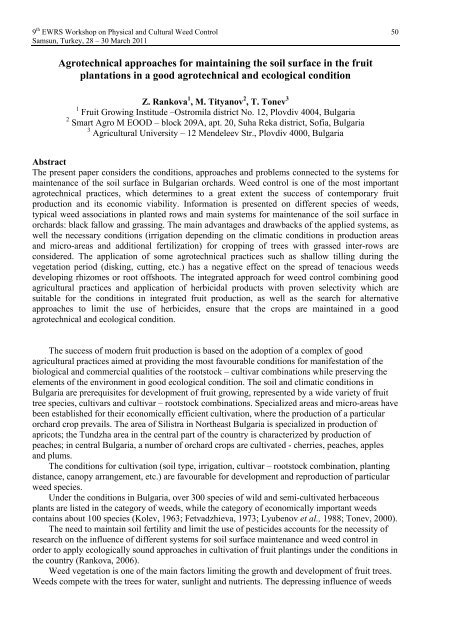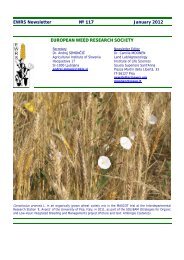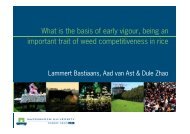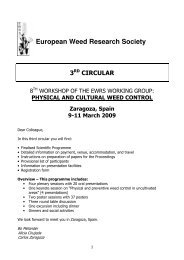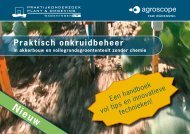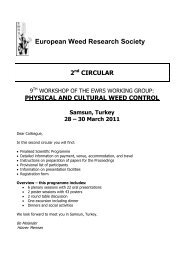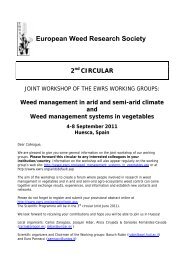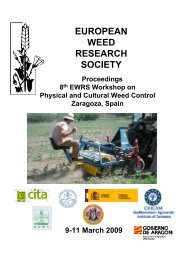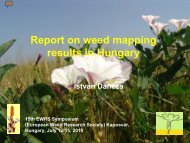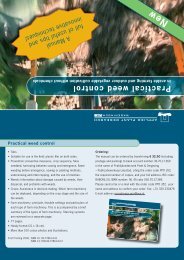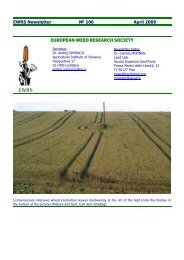Physical and Cultural Weed Control Working Group of - European ...
Physical and Cultural Weed Control Working Group of - European ...
Physical and Cultural Weed Control Working Group of - European ...
Create successful ePaper yourself
Turn your PDF publications into a flip-book with our unique Google optimized e-Paper software.
9 th EWRS Workshop on <strong>Physical</strong> <strong>and</strong> <strong>Cultural</strong> <strong>Weed</strong> <strong>Control</strong> 50<br />
Samsun, Turkey, 28 – 30 March 2011<br />
Agrotechnical approaches for maintaining the soil surface in the fruit<br />
plantations in a good agrotechnical <strong>and</strong> ecological condition<br />
Z. Rankova 1 , M. Tityanov 2 , T. Tonev 3<br />
1 Fruit Growing Institude –Ostromila district No. 12, Plovdiv 4004, Bulgaria<br />
2 Smart Agro M EOOD – block 209A, apt. 20, Suha Reka district, S<strong>of</strong>ia, Bulgaria<br />
3 Agricultural University – 12 Mendeleev Str., Plovdiv 4000, Bulgaria<br />
Abstract<br />
The present paper considers the conditions, approaches <strong>and</strong> problems connected to the systems for<br />
maintenance <strong>of</strong> the soil surface in Bulgarian orchards. <strong>Weed</strong> control is one <strong>of</strong> the most important<br />
agrotechnical practices, which determines to a great extent the success <strong>of</strong> contemporary fruit<br />
production <strong>and</strong> its economic viability. Information is presented on different species <strong>of</strong> weeds,<br />
typical weed associations in planted rows <strong>and</strong> main systems for maintenance <strong>of</strong> the soil surface in<br />
orchards: black fallow <strong>and</strong> grassing. The main advantages <strong>and</strong> drawbacks <strong>of</strong> the applied systems, as<br />
well the necessary conditions (irrigation depending on the climatic conditions in production areas<br />
<strong>and</strong> micro-areas <strong>and</strong> additional fertilization) for cropping <strong>of</strong> trees with grassed inter-rows are<br />
considered. The application <strong>of</strong> some agrotechnical practices such as shallow tilling during the<br />
vegetation period (disking, cutting, etc.) has a negative effect on the spread <strong>of</strong> tenacious weeds<br />
developing rhizomes or root <strong>of</strong>fshoots. The integrated approach for weed control combining good<br />
agricultural practices <strong>and</strong> application <strong>of</strong> herbicidal products with proven selectivity which are<br />
suitable for the conditions in integrated fruit production, as well as the search for alternative<br />
approaches to limit the use <strong>of</strong> herbicides, ensure that the crops are maintained in a good<br />
agrotechnical <strong>and</strong> ecological condition.<br />
The success <strong>of</strong> modern fruit production is based on the adoption <strong>of</strong> a complex <strong>of</strong> good<br />
agricultural practices aimed at providing the most favourable conditions for manifestation <strong>of</strong> the<br />
biological <strong>and</strong> commercial qualities <strong>of</strong> the rootstock – cultivar combinations while preserving the<br />
elements <strong>of</strong> the environment in good ecological condition. The soil <strong>and</strong> climatic conditions in<br />
Bulgaria are prerequisites for development <strong>of</strong> fruit growing, represented by a wide variety <strong>of</strong> fruit<br />
tree species, cultivars <strong>and</strong> cultivar – rootstock combinations. Specialized areas <strong>and</strong> micro-areas have<br />
been established for their economically efficient cultivation, where the production <strong>of</strong> a particular<br />
orchard crop prevails. The area <strong>of</strong> Silistra in Northeast Bulgaria is specialized in production <strong>of</strong><br />
apricots; the Tundzha area in the central part <strong>of</strong> the country is characterized by production <strong>of</strong><br />
peaches; in central Bulgaria, a number <strong>of</strong> orchard crops are cultivated - cherries, peaches, apples<br />
<strong>and</strong> plums.<br />
The conditions for cultivation (soil type, irrigation, cultivar – rootstock combination, planting<br />
distance, canopy arrangement, etc.) are favourable for development <strong>and</strong> reproduction <strong>of</strong> particular<br />
weed species.<br />
Under the conditions in Bulgaria, over 300 species <strong>of</strong> wild <strong>and</strong> semi-cultivated herbaceous<br />
plants are listed in the category <strong>of</strong> weeds, while the category <strong>of</strong> economically important weeds<br />
contains about 100 species (Kolev, 1963; Fetvadzhieva, 1973; Lyubenov et al., 1988; Tonev, 2000).<br />
The need to maintain soil fertility <strong>and</strong> limit the use <strong>of</strong> pesticides accounts for the necessity <strong>of</strong><br />
research on the influence <strong>of</strong> different systems for soil surface maintenance <strong>and</strong> weed control in<br />
order to apply ecologically sound approaches in cultivation <strong>of</strong> fruit plantings under the conditions in<br />
the country (Rankova, 2006).<br />
<strong>Weed</strong> vegetation is one <strong>of</strong> the main factors limiting the growth <strong>and</strong> development <strong>of</strong> fruit trees.<br />
<strong>Weed</strong>s compete with the trees for water, sunlight <strong>and</strong> nutrients. The depressing influence <strong>of</strong> weeds


